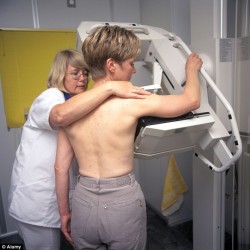
I meant to post this much earlier, but Sunday’s Los Angeles Times carried one of the most powerful Op-Eds you’ll ever read. Former Times staffer Laurie Becklund’s final piece about her breast cancer diagnosis that claimed her life on February 8. Becklund built her reputation at the Times for her coverage of exposing Salvadoran death squads and was part of the team that earned the Times a Pulitzer Prize for coverage of the 1992 L.A. riots.
Her last piece is masterful and heart breaking. You’ll learn some things about the Susan Komen Foundation that will cause you to question contributions made to this charity over the years.
From the story:
Promise me you’ll never wear a pink ribbon in my name or drop a dollar into a bucket that goes to breast cancer “awareness” for “early detection for a cure,” the mantra of fund-raising juggernaut Susan G. Komen, which has propagated a distorted message about breast cancer and how to “cure” it.
I’m proof that early detection doesn’t cure cancer. I had more than 20 mammograms, and none of them caught my disease. In fact, we now have significant studies showing that routine mammogram screening, which may result in misdiagnoses, unnecessary treatment and radiation overexposure, can harm more people than it helps….
The medical establishment tells me I have “failed” a number of therapies. That’s not right: The establishment and its therapies have failed me. The system we live in as metastatic breast cancer patients is simply not designed to deal with the cycle we are living and dying in. The estimated 40,000 women (and a few men) who die annually can’t wait years for FDA-approved, “gold standard” clinical trials. We’re dying now.
Another quarter-million Americans are estimated to be waiting in the wings. I say “estimated” because no one is required to report a metastatic diagnosis. Death certificates normally report symptoms such as “respiratory failure,” not the actual disease. We are literally uncounted.
We now know that breast cancer is not one disease. What works for one person might not for another: There is no one “cure.” We are each, in effect, one-person clinical trials. Yet the knowledge generated from those trials will die with us because there is no comprehensive database of metastatic breast cancer patients, their characteristics and what treatments did and didn’t help them.
The most powerful organization in the breast cancer universe, Susan G. Komen , has raised $2.5 billion over the last 20 years, much more than many corporations will ever earn. Yet Komen channels only a fraction of those funds into research or systems to help those who are already seriously sick. Most of that money continues to go to a breast cancer “awareness” campaign that is now painfully out of date.
We need people — patients, doctors, scientists, politicians, investors, families — to make a fresh start. We must create a new system of data collection and an open, online, broad-range database about patient histories that will provide information invaluable to those who’ve been given a death sentence. Patients as well as doctors must contribute.
The link to the story, in case you missed it above, is: http://www.latimes.com/opinion/op-ed/la-oe-becklund-breast-cancer-komen-20150222-story.html#page=1
LA Observed has a nice write up about her career and her memorial service.


I agree with you completely about the need for a new health data collection system. Unfortunately, there are many blockages to overcome. For example, the federal government has very strict rules about patient privacy (HIPAA law by Hillary Clinton in 1996) that would make any type of “open and on-line and broad-ranged” data system virtually impossible. All three of these desired features are prohibited by HIPAA. Medical research, such as on the adverse side effects of drugs, had been seriously blocked by this law. It was never easy before, but now it is infinitely more difficult to collect medical data for research because of lack of reporting, which served to protect both the doctors and the drug companies. The Obama administration pushed for electronic medical record (EMR’s) onto doctors and hospitals a few years ago, but it turned out to be a big fat scam that made things even less transparent. By now most doctors and hospitals have their own expensive EMR’s that can’t and won’t connect with each other. You will pull your hair out if you could only see the incompetent and fraudulent EMR systems that are in place now. It would make Oregon’s now-defunct Obamacare insurance exchange look like a genius. Then there is the Obamacare “reform” that is now making us even more entrenched in with the HMO’s and private insurance companies, and they are not going to share data.
Google had a really good idea for a health information network (Google Health) that would’ve made it very easy for doctors and researchers to quickly pick out patterns in diseases and their treatment effects. But it was too far ahead of its time, and it could not overcome HIPAA.
Sincerely,
Si Nguyen, in Lake Forest